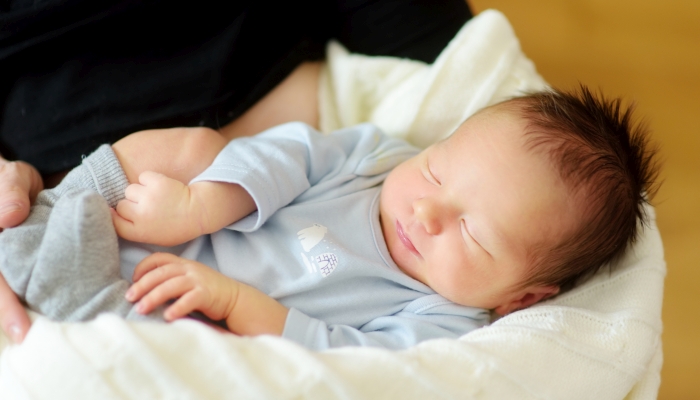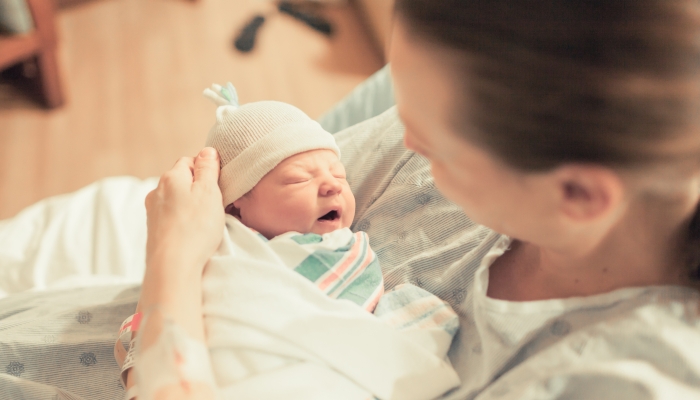Why Is My Newborn Grunting and Squirming While Sleeping?

- Newborn grunting and squirming while sleeping is completely normal. Several factors contribute to the noise and movements your baby exhibits at night.
- A newborn may grunt more when struggling to have a bowel movement, also called grunting baby syndrome. This typically lasts a few weeks and often resolves on its own.
- Adjusting sleep environments can lower the risk of breathing issues that might contribute to weird noises at night.
- Be aware of when newborn grunting or squirming becomes abnormal and know when to seek medical attention as soon as possible.
I loved to watch my newborn daughter snooze. Her little eyes would rapidly flutter behind her closed eyelids. Her lips would occasionally quiver into a smile and I wondered what she may be dreaming about. I would find myself drifting off watching her small chest rhythmically go in and out, in and out.
And then suddenly, the slightest noise would jolt me back awake. In those first few weeks as a new parent, I was on high alert for anything that might be wrong. When I heard my newborn grunting and squirming while sleeping it worried me. In my half-awake state, I couldn’t discern if something was wrong. Was she in pain? Immediately I was hyper-focused on my daughter and unable to rest myself. It was concerning to hear my baby grunting.
It’s normal for new parents, and even seasoned parents, to worry when a baby starts making strange noises at night. Understanding the causes of newborn grunting can help ease your concerns and help everyone have a more restful night.
Is It Normal for Newborns to Make Noises While Sleeping?
Unlike the coos and grunts when alert and awake, weird noises during the night are unsettling. Many parents worry that a baby’s grunting means something is wrong or the baby is in pain. Rest assured, most babies grunt and squirm a lot during rest and it isn’t necessarily a sleep problem.
A newborn baby grunting and squirming while sleeping is perfectly normal. Baby sleep is restless. Young babies squirm and wake up a lot, commonly sleeping for short periods.
In the first few months of life, everything is new for your baby. A newborn is learning how to eat, sleep, communicate, and even have a bowel movement.

Common Causes of Infant Sleep Noises
During sleep, babies may grunt, gurgle, squeak, squirm, or snore. This may be caused by:
1. Digestion
It is common for a baby to make a grunting noise and turn red in the face as they try to have a bowel movement. Your baby’s digestive system is new. Your baby is learning how to properly contract the abdominal muscles to pass stool. Figuring out how to utilize these muscles can cause your baby to grunt.
As your newborn’s digestive system evolves and has more bowel movements, grunting noises may decrease or disappear.
A 2013 study by Di Lorenzo focused on other functional gastrointestinal disorders and found that grunting associated with passing stool, also known as Grunting Baby Syndrome, best resolves with no intervention. As your baby continues to pass stool, he learns how to properly relax his pelvic floor, thus reducing the need to strain and grunt.
Most babies have a bowel movement daily, but it is normal for some babies to go 1-2 days between bowel movements. If your baby is constipated, hasn’t had a bowel movement in a couple of days, and is grunting without passing stool, consult your pediatrician.
2. Acid Reflux
Since a newborn’s digestion is still developing, a baby may also experience acid reflux. At night, babies typically fall asleep shortly after a feeding. After eating a baby is placed safely on its back. This supine position can cause the stomach to force any excess food back up into the esophagus or food pipe. This excess spit-up enters the mouth, and your baby might grunt with discomfort or make a gurgling sound.
3. Respiratory Development
It is completely normal for young babies to produce a lot of mucus and saliva because of their still-developing respiratory systems. In addition, a young baby has a tiny nose and nasal passages. Excess mucus in these small spaces can lead to congestion and odd noises.
Newborn babies breathe through their noses at a faster rate than older children. Raspy breathing or noisy breathing during sleep is common as air passes through blocked nasal passages.
Excess saliva also settles in the back of the mouth when babies lay on their backs. As the baby breathes, this saliva can cause a rattling or grunting sound. If your baby is teething, more saliva is created. Sleep disruption during teething in addition to excess saliva increases the baby’s sleep sounds. Learning techniques on how to help your teething baby sleep can reduce some of these disruptions allowing for a deeper rest at night.
4. Exploring and Discovering Voice
In the first few months of life, your baby’s brain is rapidly developing. When alert, your baby may start to coo, laugh or even growl. Experimenting and exploring their voice is an exciting time for your baby. During sleep, you may hear these same sounds.
5. Sleep Cycles
In the first six months of life, a baby’s sleep cycles more frequently from deep to light sleep, spending more sleep time in REM (rapid eye movement) cycles. REM stages are considered active sleep, when dreams and sleep talking may occur. At this stage, it is common for a baby to squirm, squeak and make other noises.
Breathing during REM sleep may also change. During this stage, you may witness periodic breathing when the baby breathes rapidly and then stops for a few seconds and then repeats. It is common to hear deep and raspy breathing or occasional grunting during this stage.
If your baby experiences sleep disruptions or your baby is fighting sleep, you may also notice an increase in grunting and squirming. Different techniques can help your infant rest better and better rest may help decrease noises at night too.

How Long Does the Grunting and Squirming Phase Last?
Typically, newborn babies outgrow grunting and squirming during sleep within a few weeks, depending on the cause.
If a newborn baby grunts during bowel movements, this will resolve within a few weeks. When a baby’s digestive system matures it becomes more comfortable with passing stool and strains less.
After six months, infant sleep matures and REM cycles decrease. With more periods of deep sleep and fewer rem cycles, newborn sleep is quieter.
Reducing Newborn Grunting and Squirming While Sleeping
When a baby makes grunting noises throughout the night, it may be hard to get good rest yourself. Here are some things you may do to try and find some quieter sleep:
Reduce Possible Breathing Issues
In 2022, the American Academy of Pediatrics released updated safe sleep guidelines for newborns. This includes ensuring your baby is in a safe environment and laying flat on their back. Doing so can reduce your baby having difficulty breathing or irregular breathing while sleeping. Minimizing respiratory distress will allow your baby to breathe easier at night and make less noise.
To minimize breathing issues associated with acid reflux, try keeping your baby upright 15-20 minutes after a feeding. Holding your newborn upright allows food to digest more in the stomach and reduces the risk of excess food entering the esophagus. If this technique does not help, consult with your medical professional for alternative strategies to reduce reflux.
Clear Congestion
There are different ways to help your congested baby sleep better. Try to clear the nasal passage by using a nasal aspirator, infant saline rinse, or a cool-mist humidifier. Give your infant a warm bath before bed, or have them sit in the bathroom during a steamy shower.
Create A Bedtime Routine
An overtired baby may wake more often and make more noises. Creating a bedtime routine and reducing stimulation can help your baby sleep deeper and quieter. Adding white noise to your routine can also help calm your newborn. White noise also limits the intensity of baby’s sleep sounds that you hear, allowing you to get better rest.
If your baby is struggling with sleep, find a sleep training method that you’re comfortable with.
Tummy Time
When alert, utilize tummy time to strengthen your baby’s abdominal muscles. Tummy time also helps infants practice rolling. Opportunities to strengthen core and back muscles will lead to deeper periods of sleep. As your baby builds the strength to get more comfortable in the crib, you may notice your baby sleeping facedown and sleeping better.
When Should I Worry About My Baby’s Sleep Noises?
There are a few things to pay attention to if you find your baby’s sleep noises unsettling. If your baby exhibits any of the following symptoms contact your doctor immediately:
- Appears bluish
- Appears in distress
- Grunting with every single breath
- Has a fever, is vomiting, blood in the stool, or bloated belly
- Is constipated
- Breathing pauses for more than a couple of seconds
- Rapid breathing (more than 60 breaths a second)
These symptoms may be a sign of illness or other health conditions.
If your newborn baby is breathing abnormally fast with persistent grunting, chest retractions, and/or flared nostrils, your baby may be experiencing respiratory distress. Seeking medical attention immediately can reduce further health complications.

The information WonderBaby provides is not intended to be, and does not constitute, medical or other health advice or diagnosis and should not be used as such. Always consult with a qualified medical professional about your specific circumstances.
Related Posts

Sleep, Special Needs
Safe Place Bedding Travel Bed Review
Traveling with a special needs child can be stressful! Having a safe, durable, and easy to use travel bed can make traveling so much easier!

Sleep, Special Needs
Sleep Regimen for Premature Babies: Special Considerations
It can take premature babies much longer than their full-term peers to sleep for long stretches. A preemie sleep schedule may encourage better sleep.

Sleep
Mastering the Bedtime Routine: 3 Tips for a Peaceful Night’s Sleep
From around six weeks, a newborn bedtime routine can help your baby learn the difference between day and night and prepare for a restful night’s sleep.